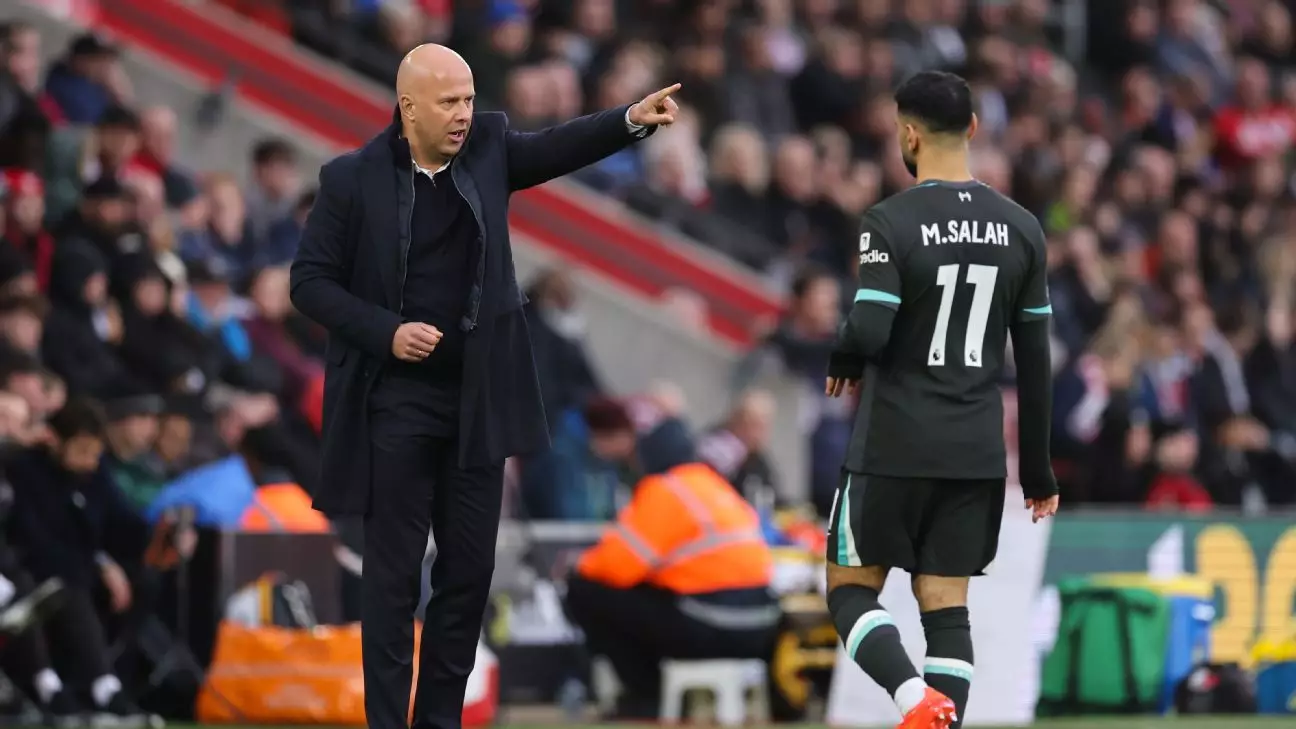In the realm of football, few stories garner as much attention as those surrounding player contracts, especially when they involve a star player like Mohamed Salah. The Liverpool forward’s current contract situation has raised eyebrows, creating a swirl of speculation as he approaches the final months of his deal. With his commitment to the club often discussed, it is essential to analyze the broader implications of Salah’s comments and performance, as well as the club’s strategic approach to managing the situation.
Salah’s existing contract with Liverpool runs out at the end of the current season, and the lack of a formal offer for renewal has reportedly left him feeling uncertain about his future at Anfield. His recent comments following a stellar performance—where he scored twice in Liverpool’s crucial 3-2 victory against Southampton—highlight a gap between the player’s expectations and the club’s action. The forward candidly acknowledged his feelings of being “more out than in” regarding his future with the team, a statement that underscores the gravity of the situation.
Yet, it is essential to recognize that expressing concerns or desires for clarity regarding one’s contract does not necessarily equate to distraction. When discussing high-stakes environments like professional sports, player focus is paramount. Salah’s candidness reflects a desire for transparency, which, paradoxically, could help him concentrate better on the pitch rather than detract from it.
Liverpool manager Arne Slot has been vocal about his belief that Salah’s performance remains unaffected by contract concerns. In response to the media frenzy following Salah’s interview, Slot emphasized that he believes Salah is “fully focused on the game,” dismissing claims that the player is distracted by contract negotiations. Such statements reflect a broader trend in sports management to ensure that players are mentally sharp and untroubled by off-field affairs.
Slot’s perspective is particularly important because the management’s approach influences players significantly. By instilling confidence in Salah—stating the team’s expectation for him to deliver consistently—Slot aids in fostering an environment where players can thrive despite external pressures. The confidence expressed by Slot should not be underestimated, as it can motivate Salah to focus on what he does best: scoring goals and influencing matches.
The public dimension of Salah’s comments has not gone unnoticed, with former Liverpool defender Jamie Carragher labeling the forward’s openness as “selfish.” This sentiment introduces a round of criticism, which inevitably leads to discussions about the player’s image and his responsibilities as a high-profile athlete. The tension between personal transparency and public professional expectations is a delicate balance that elite athletes must navigate.
While Carragher’s criticism stemming from a place of concern for team cohesion is understandable, it raises questions about the responsibilities of players as representatives of their clubs. Salah’s focus on his future demonstrates a natural human instinct to seek clarity, yet this desire risks being misinterpreted as disinterest or selfishness in the eyes of fans and analysts alike.
As the Reds gear up to face Real Madrid in an important Champions League clash, injury-related setbacks pose another layer of complexity. Trent Alexander-Arnold’s absence from the starting lineup, coupled with the uncertainty surrounding players like Alisson Becker and Diogo Jota due to injuries, highlights the unpredictable nature of football. The club must manage these situations while securing the future of its star players, which remains a crucial aspect of maintaining competitiveness at the highest level.
The approaching January transfer window adds urgency to Liverpool’s negotiations with Salah and other contract-related matters. With potential suitors circling, particularly Real Madrid linked to both Salah and Alexander-Arnold, the stakes are high not just for the player involved, but for the club’s strategic direction.
Mohamed Salah’s contract situation has sparked a multifaceted debate involving player focus, team dynamics, and public perception. Many factors influence the outcomes of such situations, including management strategies, player commitment, and media narratives. As the season unfolds, it remains to be seen how Liverpool will navigate these challenges while maintaining performance levels and addressing the aspirations of one of its most critical players. The convergence of personal ambition and club loyalty will undoubtedly play a significant role in shaping the future of Salah and Liverpool.

